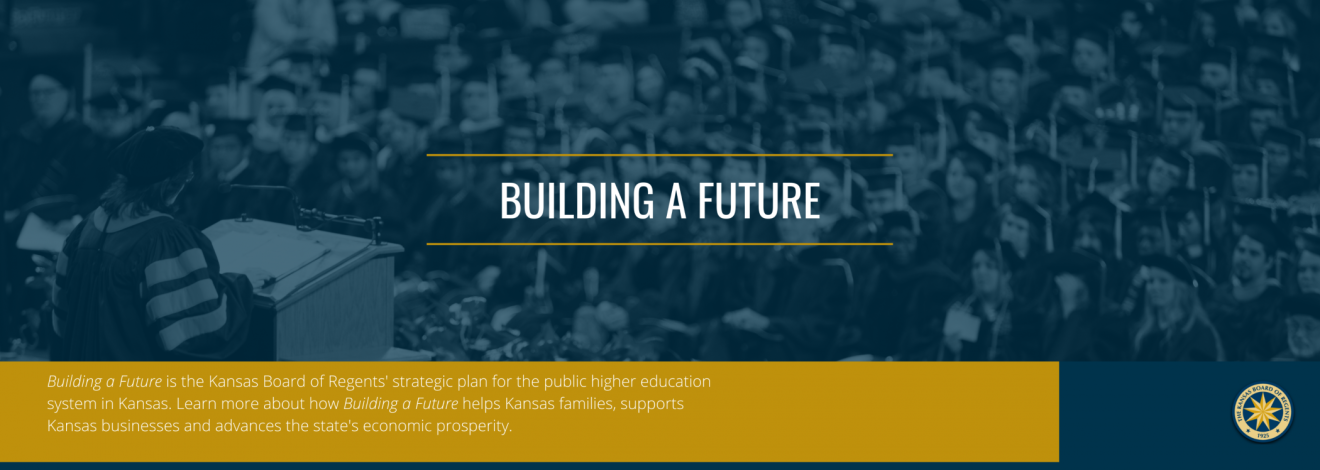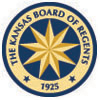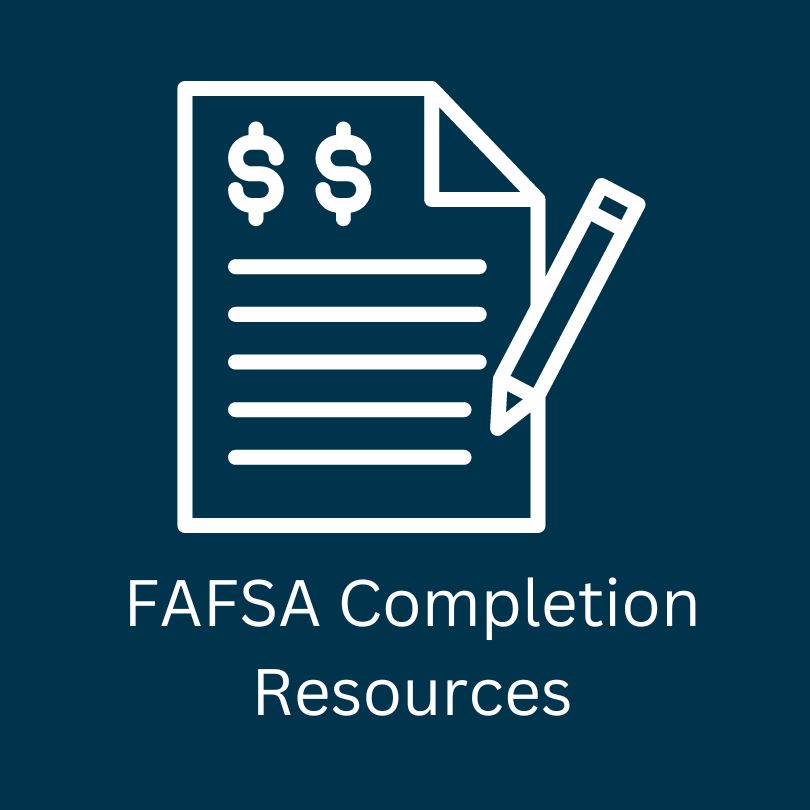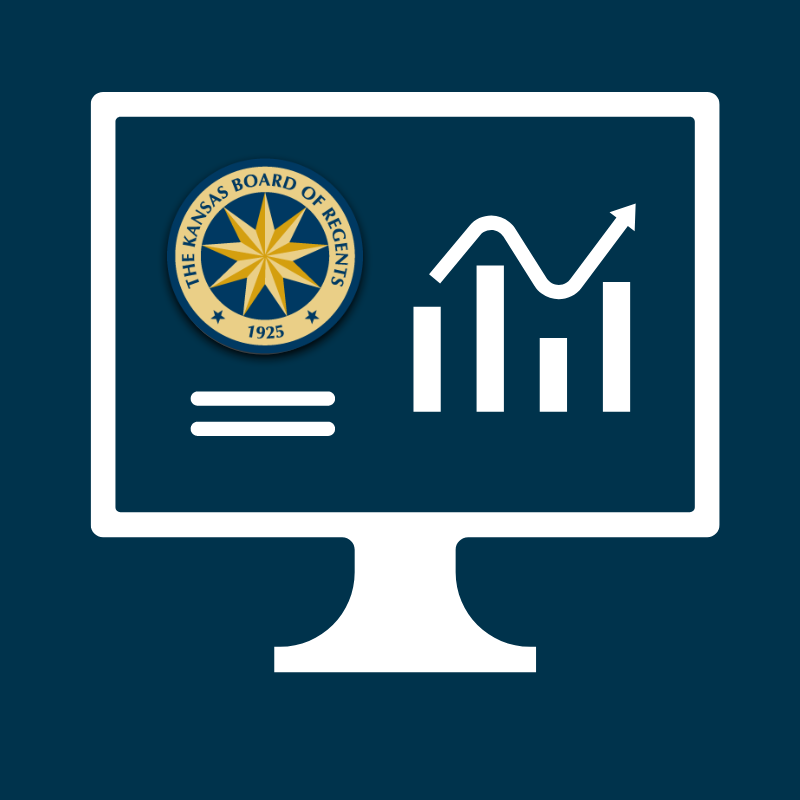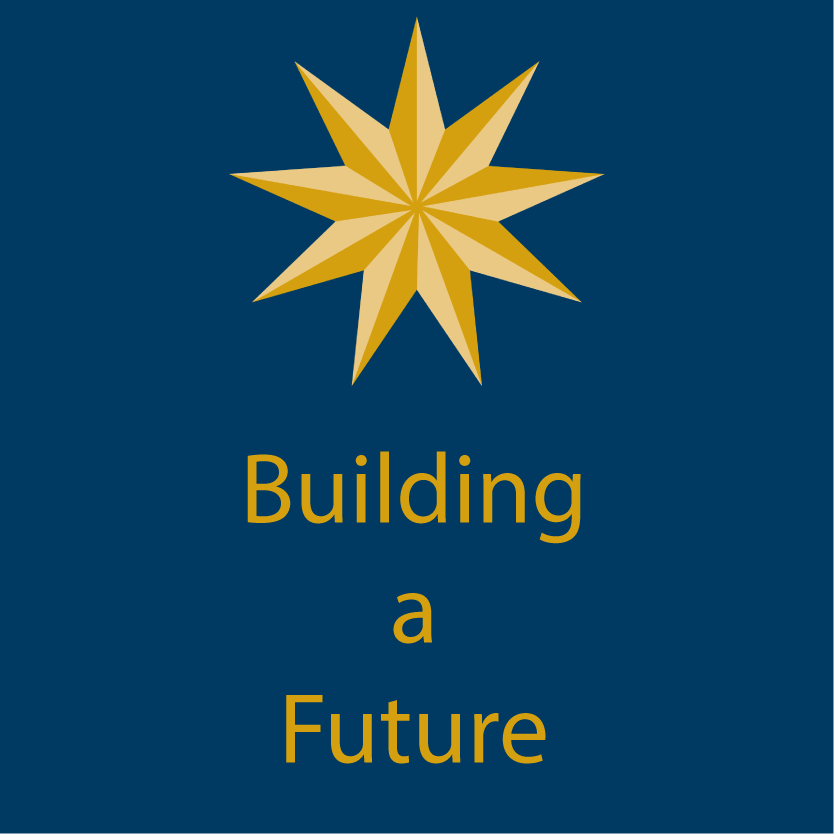The University of Kansas is a comprehensive research and teaching university that serves as a center for learning, scholarship, and creative endeavor. Since 1909, KU has held membership in the esteemed Association of American Universities (AAU), a distinction held by only 71 distinguished public and private universities. Across its five campuses (Lawrence, Kansas City, Overland Park, Wichita, and Salina), KU enrolls nearly 30,000 students and awards over 7,000 degrees and certificates annually.
Mission Statement:
We educate leaders, build healthy communities, and make discoveries that change the world.
KU Lawrence-Edwards Vision:
To be an exceptional learning community that lifts each member and advances society.
KU Medical Center Vision:
To improve lives and communities in Kansas through innovation in education, research, and health care.
University Values:
The acronym "IRISE" spells out the first letter of each of the university's five values:
- Integrity
- Respect
- Innovation
- Stewardship
- Excellence
University Metrics:
Education
- Student enrollment
- Retention rate
- Graduation rate
- Average student debt
Service
- Economic impact
- Community perception
- Service to the state
- Workplace diversity
Research
- Research Expenditures
- Recognition of Faculty Excellence
- Scholarly Activity
Pittsburg State University, a comprehensive regional university, provides undergraduate and graduate programs and services to the people of southeast Kansas, but also to others who seek the benefits offered. This is accomplished by the unique combination of academic programs in the four colleges of the University Arts and Sciences, Business, Education and Technology. The University is equally committed to fulfilling its statewide mission in technology and economic development by facilitating partnerships with secondary and postsecondary educational institutions, businesses and industries.
The University supports an organizational and interpersonal structure that actively encourages individuals to achieve their potential. The University provides programs and services that create opportunities for students and other individuals to develop intellectually, ethically, aesthetically, emotionally, socially and physically. The University provides intellectual leadership and multicultural experiences that contribute to the preservation of the heritage of the region and the enhancement of its inhabitants. Finally, the University recognizes the world as interdependent and, thus, seeks to promote a broad and interactive international perspective.
The University fulfills the traditional academic missions of teaching, scholarship and service. Excellence in teaching is the primary focus of the University. The University recognizes that active scholarship and creativity add vitality to teaching, expand and refine the knowledge base and are instrumental to the professional development of the faculty and staff. Programs of professional and community service promote and strengthen University endeavors. Pittsburg State University fosters a campus culture of assessment and accountability that supports strategic planning and the continuous improvement of its academic programs and administrative processes.
The mission of Kansas State University is to foster excellent teaching, research, and service that develop a highly skilled and educated citizenry necessary to advancing the well-being of Kansas, the nation, and the international community. The university embraces diversity, encourages engagement and is committed to the discovery of knowledge, the education of undergraduate and graduate students, and improvement in the quality of life and standard of living of those we serve.
Kansas State University is a comprehensive, research, land-grant institution serving students and the people of Kansas, the nation, and the world. Since its founding in 1863, the University has evolved into a modern institution of higher education, committed to quality programs, and responsive to a rapidly changing world and the aspirations of an increasingly diverse society. Together with other major comprehensive universities, K-State shares responsibilities for developing human potential, expanding knowledge, enriching cultural expression, and extending its expertise to individuals, business, education and government. These responsibilities are addressed through an array of undergraduate and graduate degree programs, research and creative activities, and outreach and public service programs. In addition, its land-grant mandate, based on federal and state legislation, establishes a focus to its instructional, research, and extension activities which is unique among the Regents’ institutions.
Through quality teaching, the University is committed to provide all students with opportunities to develop the knowledge, understanding, and skills characteristic of an educated person. It is also pledged to prepare students for successful employment or advanced studies through a variety of disciplinary and professional degree programs. To meet these intentions, the institution dedicates itself to providing academic and extracurricular learning experiences which promote and value both excellence and cultural diversity. K-State prepares its students to be informed, productive, and responsible citizens who actively participate in advancing cultural, educational, economic, scientific, and socio-political undertakings.
Research and other creative endeavors comprise an essential component of K-State's mission. All faculty members contribute to the discovery and dissemination of new knowledge, applications, and products. These efforts, supported by public and private resources, are conducted in an atmosphere of open inquiry and academic freedom. Basic to the pursuit of this mission is the University's commitment to broad-based programs in graduate education at both the master's and doctoral levels.
Faculty, staff, and administrators share their expertise through service to the university and disciplinary organizations, via outreach, engagement, and extension-related activities. Their work provides support to numerous projects related to the goals, missions, or aspirations of the departments, colleges of the university, and to the members of the professional community. Through outreach and engagement initiatives, partnerships are established with various stakeholders to translate knowledge and basic research into applications that address public needs. These service activities are integrally related to the land-grant mission.
Extension is governed by Kansas statutes that empower elected county councils and district governing boards with authority and responsibility to assess needs and conduct a local educational program in cooperation with Kansas State University and the United States Department of Agriculture (USDA). A network of local extension professionals and volunteers link Kansas State University faculty, the National Cooperative Extension System to the USDA which produces high-quality educational programs.
Dual Credit Cooperative Agreements
The Kansas Challenge to Secondary School Students Act, K.S.A. 72-3220 through 72-3224, (Challenge Act) provides a means for school districts, in cooperation with eligible postsecondary institutions, to challenge high school students by procuring early college opportunities. The Kansas Board of Regents encourages all system postsecondary institutions to collaborate with local school districts and provide dual credit opportunities to high school students through cooperative agreements entered pursuant to the Challenge Act. The Challenge Act does not mandate system postsecondary institutions to offer dual credit enrollment to students in local school districts. However, if an eligible system postsecondary institution chooses not to offer dual credit enrollment with local districts pursuant to the Challenge Act, in accordance with Board policy for Off-Campus Delivery of Academic Courses and Programs, the home institution shall allow eligible system postsecondary institutions outside the institution’s service area to provide the Challenge Act opportunities with those school districts. The Challenge Act requires dual credit to be offered only through a cooperative agreement.
“Dual Credit Cooperative Agreement” means a written memorandum of understanding between an eligible postsecondary institution and a school district entered pursuant to the Kansas Challenge to Secondary School Students Act for the purpose of offering dual credit courses to eligible students who receive both high school credit and college credit.
For more information, contact your local high school. Policies are found in Chapter III, Section A of the Policy Manual
Dual Credit Resources
Coming soon!
The following opportunities are currently available:
Teacher Education Competitive Grant Program
The Kansas Teacher Education Competitive Grant Program (KTECGP) was established through Kansas House Bill 2185 (2007) to increase the number of licensed teachers in hard-to-fill disciplines and/or underserved geographic areas of the state.
The Kansas Board of Regents administers this grant in which the six state universities and Washburn University are eligible to apply for funds. Institutions may use grant funds to create a new teacher education program or expand an existing program and must match grant funds on the basis of $1 from the institution to every $2 received from the grant. In the 2021 round, applicants were asked to create this program in partnership with at least one Kansas community college to develop new transfer pathways for future educators.
This initiative, which provides resources to institutions, is contingent upon funds available in the Teacher Service Scholarship Program, which provides financial support for students pursuing teaching careers in Kansas. The chart below outlines the projects and funds awarded.
Grant programs will be reviewed each January and funds are reallocated based on each program's success & areas of growth.
|
INSTITUTION- Director |
PROJECT-Target areas & Community College Partners |
Amount Awarded for AY2021-22 |
Amount Awarded for AY2022-23 |
Amount Awarded for AY2023-24 |
Amount Awarded for AY2024-25 |
|
Emporia State University -Tiffany Hill, Sara Schwerdtfeger, Todd Roberts |
FAST: Fellowship for Acceleration to Student Teaching - Elementary Education Butler Community College, Johnson County Community College, Highland Community College, Topeka USD 501, Kansas City Kansas USD 500, & Wichita USD 259 |
$86,000 |
$106,000 |
$106,000
+$7,000 additional funds for Teacher Ed. Marketing |
$110,000
+$10,000 additional funds for Teacher Ed. Marketing |
|
Fort Hays State University -Matthew Clay |
Classroom to Classroom Project (C2C) -Elementary Education & Elementary Special Education Barton Community College, Dodge City Community College, Seward County Community College, & Liberal USD 480 |
$144,264 |
$36,854 |
$36,854
+$7,000 additional funds for Teacher Ed. Marketing |
$36,854
+$10,000 additional funds for Teacher Ed. Marketing |
|
Kansas State University -F. Todd Goodson |
TRUST: Training for Rural & Urban School Teachers -Elementary & Secondary Education Kansas City Kansas Community College & Seward County Community College |
$160,135 |
$140,135 |
$140,135
+$7,000 additional funds for Teacher Ed. Marketing |
$170,000
+$10,000 additional funds for Teacher Ed. Marketing |
|
Pittsburg State University -Jean Dockers |
-Elementary Education & Elementary Special Education Fort Scott Community College, Independence Community College, Neosho Community College, Southeast Kansas Interlocal, Tri-County Special Education Interlocal, & Paola USD 368 |
$36,854 |
$144,264 |
$144,264
+$7,000 additional funds for Teacher Ed. Marketing |
$160,000
+$10,000 additional funds for Teacher Ed. Marketing |
|
University of Kansas -Kelli Feldman |
Expanding the World of Teaching through Enhanced Teacher Education Pathways -Elementary Education, English Language Arts, Mathematics, Sciences & Special Ed Kansas City Kansas Community College & KCKPS USD 500 |
N/A |
N/A |
$65,106
+$7,000 additional funds for Teacher Ed. Marketing |
$80,000
+$10,000 additional funds for Teacher Ed. Marketing |
|
Washburn University -Cherry Steffan |
PTP: Paraprofessionals to Teachers Program --Special Education or STEM Education Barton Community College, Topeka USD 501, Prairie Hills USD 113, Seaman USD 345, & Auburn Washburn USD 437 |
$36,854 |
$36,854 |
$36,854
+$7,000 additional funds for Teacher Ed. Marketing |
$100,000
+$10,000 additional funds for Teacher Ed. Marketing |
|
Wichita State University - Julie Thiele |
-Special Education or STEM Education Butler Community College, WSU Tech, & Wichita USD 259 |
N/A |
N/A |
$90,000
+$7,000 additional funds for Teacher Ed. Marketing |
$90,000
+$10,000 additional funds for Teacher Ed. Marketing |
|
Total Awarded: |
$464,107 |
$464,107 |
$668,213 |
$816,854 |
New for 2023-2024 grant cycle: Due to increased funds, All public universities were granted funds for marketing Teacher Education programs. The RFP was reopened; KU and WSU submitted a proposal to enter the grant program. Awards are described and indicated in the chart above.
Grant Reviewers:
| Lynn Segebrecht | FHSU/WSU |
| Jacob Enick | ESU |
| Heather Hall | KSU |
| Quinn White | PSU |
| Daniel O'Neill | Washburn/KU |
| Karla Wiscombe | |
| Mistie Knox |
Kansas Teacher Service Scholarship
This service obligation scholarship program provides financial assistance to both students pursuing bachelor's or master's degree programs and currently licensed teachers pursuing endorsement in hard-to-fill disciplines or master's degrees in hard-to-fill disciplines or either group planning to teach (K-12) in an under-served geographic area in Kansas. Access more information and application details. Earn up to $5,830 per year!
Questions about the Kansas Teacher Service Scholarship may be directed to:
Jamie Whitmore
Student Financial Aid Specialist
785.430.4256
Elementary and Secondary Education Act Title II
Elementary and Secondary Education Act (ESEA) TITLE II: Preparing, Training, and Recruiting High Quality Teachers and Principals and Other School Leaders (formerly Improving Teacher Quality Grant Program)
All Title II funds are awarded to each state plan which, in Kansas, is through the Kansas Department of Education (KSDE).

